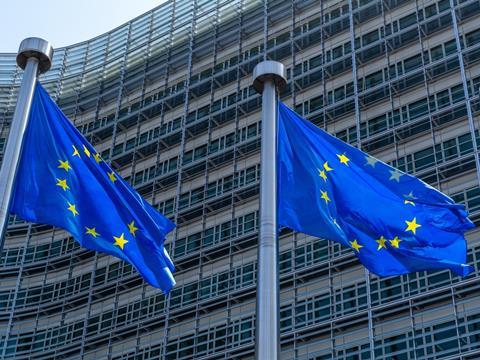
A legal assessment commissioned by European Plastics Converters (EuPC), IK Industrievereinigung Kunststoffverpackungen, and Elipso suggests that the Packaging and Packaging Waste Regulation (PPWR)’s special rules for plastic packaging and exemptions for other packaging materials are ‘very likely not compatible’ with EU law.
Conducted by global law firm Dentons, the report asserts that such rules have a ‘high probability’ of discriminating against plastic packaging and could thus go against the EU principle of equal treatment. For instance, it identifies provisions that only ban plastic packaging and require its reuse, as well as exemptions for coated paper from recycled content quotas, as ‘very likely’ violations of the principle of equal treatment, with ‘no objective reasons’ for these materials being singled out.
It is feared that introducing such rules will cause lightweight, easily recyclable plastic packaging to be replaced with heavier, less recyclable materials, which would increase the amount of packaging waste and greenhouse gas emissions – thus going against the aims of the PPWR itself.
The report also claims that the European Parliament and Council have not considered ‘all relevant factors’ in their proposals, leading to allegations of procedural infringements.
Consequently, EuPC, IK, and Elipso have come together to encourage Member States and the European Parliament to remove material-specific rules from the PPWR in the ongoing trilogue negotiations. This move is hoped to ensure legal and planning certainty for companies.
“Council and Parliament have so far ignored the existing scientific facts and findings on the benefits of plastic packaging in a climate-neutral circular economy,” says Bernard Merkx, director general of EuPC. “To make matters worse, the large number of plastic discriminations in the PPWR completely reverses the principle of material neutrality. The report shows the legislator clear limits.”
Banning plastic film on six-packs of bottles or plastic packaging for unprocessed fruit and vegetables is also believed to violate EU law, and the legislator has not proposed any ‘less burdensome’ measures.
“The bans only on plastic packaging contradict the original objectives of the PPWR and the environmental principles of the EU,” continues criticises Gaël Bouquet, director general of Elipso. “They would merely lead to a switch to single-use packaging made from other materials, e.g. paper and cardboard packaging, which is often less sustainable.”
“It’s still not too late,” says Dr Martin Engelmann, managing director of the German IK Industrievereinigung Kunststoffverpackungen. “We are calling on the Council and Parliament to remove the special rules for plastic packaging and exemptions for other packaging materials in the ongoing trilogue negotiations.
“This is the only way to create the legal and planning certainty that companies need for the transformation to a circular economy.”
The companies conclude that the ‘legal fragility’ of the current PPWR proposal could cause national and continental legal disputes and slow down the pursuit of a circular economy for packaging, and therefore encourage the European legislator to ensure the legal certainty of the text.
The statement falls in line with a range of other criticisms surrounding material-specific rules. Isabell Schmidt and Martin Engelmann from IK previously shared their views that the PPWR draft could lead to positive change – but, at the time of writing, contained “considerable economic and ecological risks for misguided decisions, which should be corrected in the legislative process”. These included reuse quotas only aimed at plastic packaging, with no justification given as to why these materials were singled out.
Plastics Europe made a similar argument that the suggested legislation could impact pre-existing recycling processes for flexible plastics, which play a valuable role in product protection and transportation.
On the other hand, a joint statement from 185 investors with combined assets of US$10 trillion called upon industry players to support plastic reduction policies rather than condemning them, describing them as “[companies’] chance to be part of the solution”.
In the lead-up to the vote on the PPWR proposal last November, MIWA Technologies’ impact strategy specialist, Ivana Sobolíková, stated that increased and precise targets for plastic reduction in the Compromise Amendments – 10% by 2030, 15% by 2035, and 20% by 2050 – were ‘generally regarded as a step in the right direction’.
A cross-sectoral statement also encouraged the European Commission and Member States to embrace mass balance as a method of developing harmonized calculating rules for recycled content across the continent. Doing so is hoped to help companies plan, finance, secure permits, and develop the infrastructure necessary to meet targets by 2030 and 2040.
In another legal development, the Court of Justice of the European Union (CURIA) has maintained the EU’s prohibition of oxo-degradable plastics on the market and dismissed legal claims made by Symphony Environmental.
If you liked this article, you might also enjoy:
The L’Oréal approach to packaging sustainability
The way we talk about plastic needs to change – here’s how to get it right
What steps is Apple taking to make its packaging more sustainable?














No comments yet